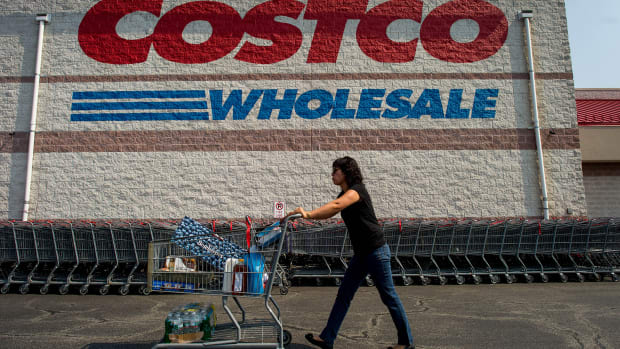
Buying Homebuilder Stocks at 'Sell' Levels
BOSTON (The Street Ratings) -- In a story last week, I said it was a good time to evaluate homebuilder stocks because of depressed values and negative sentiment -- two key ingredients for a rebound.
Here's a closer look at specific stocks in the industry.
Homebuilders have been decimated over the past month (see second chart, below), with the
S&P Homebuilders ETF
(XHB)
losing a quarter of its value. Worries over a double-dip recession, high unemployment, poor housing sales and scant work on new homes have led investors and economists to conclude that there's no recovery in the offing.
I offered that, with such dim hopes, a contrarian stance could lead to big-time profits.
Take a look at the first chart below, which shows the price-to-book ratio. We now stand at 1.06 times, which is 25% below the average of 1.4 times from 2009 to 2011, and 50% below the average of 2 times from 2002 to 2005.
I acknowledge that we are unlikely to see an immediate recovery in housing. But based on valuations, and what I sense to be more stability with many companies in the industry, it could be well worth the risk for a longer-term investor.
As to the risks, the biggest concern is the amount of shadow inventory that could potentially flood the market. I've heard 20 months of supply is waiting in the wings. But there is also discussions surrounding turning foreclosure inventory into rental units, which might help relieve pricing pressure.
I've provided details of homebuilders' geographic footprint inventory, financial position, insider activity, and the level of risk and reward. This week I'm looking at five names that have been hit the hardest over the past month:
Beazer
(BZH)
,
Pulte
(PHM)
,
M/I Homes
(MHO)
,
KB Home
(KBH)
and
Hovnanian
(HOV)
. I will follow up with another piece covering the rest of the group.
Beazer Homes USA
(BZH)
: Beazer, based in Atlanta, is the eighth-largest homebuilder in the country. Its operations are geographically diversified in 16 states, with most of the focus on entry-level homebuyers in the Southeast and Mid-Atlantic states. The price point for Beazer homes is on the low end. The average selling price was $213,000 in the most recent period.
Despite trading at only half of its reported book value, the stock is saddled with debt -- to the tune of $1.5 billion, or around 86% of its total capital structure. The good news is that the maturities on the debt don't come due until 2015, and the company has $275 million in cash to hold down the fort until then. The problem is that estimates are still calling for losses in 2012 of $1.12 per share.
One person who thinks Beazer is in good shape is analyst Josh Levin at
Citigroup
, who said it is "highly unlikely" the company could face trouble meeting short-term obligations. His analysis suggests Beazer "can survive another two to three years given its current liquidity profile," even if home prices continue to fall.
To note, despite the company's troubles, the stock's No. 1 holder is famed hedge fund manager John Paulson, who owns 7.8% of outstanding shares. Also, David Tepper at Appaloosa Management just took a stake in the company.
My Take:
A big risk, probably one of the riskiest homebuilding bets, due to its debt profile. It's a gamble, one that has some high-profile names invested in it. If it works, and housing improves sooner rather than later, the reward could be gigantic. But if housing starts worsen, and prices decline, Beazer probably has the highest chance (maybe aside from Hovnanian) of facing bankruptcy.
Stock Performance Past Month:
-53.6%
Current Price to Book:
0.47
Price to Book Ten Year Average:
1.09
Discount to Average on P/B Basis:
57%
Pulte
(PHM)
: Pulte is now the nation's largest homebuilder, following a 2009 deal to purchase rival Centex. Pulte targets buyers in nearly all home categories, and is widely diversified across the country. Recently, the company has focused expansion efforts on more affordable housing and on mature buyers (age 50 and over). The average selling price for a Pulte home in the past quarter was $249,000, down from $262,000 in 2010. (The company notes that tax credits were boosting prices last year.)
Like other homebuilders in the industry, the results haven't been overly impressive. In the most recently reported quarter, Pulte said revenue from home sales fell 29%. While the drop in sales is disappointing, management has seen signs of stability in the industry. During the quarterly call, it noted that the industry is "moving along a cyclical bottom and is proving to be fairly stable." And while a lack of demand still plagues the industry, "buyer demand appears to have stabilized following expiration of the homebuyer tax credit."
Pulte won't win any awards for balance-sheet strength, either. S&P recently downgraded the debt from BB+ to BB, changing the outlook from stable to negative. The company is carrying a long-term debt position of $3.3 billion, equating to roughly 61% of total firm capital. The company, however, does have $1.1 billion in cash on hand, which should buffer any downturn and allow the company some flexibility in acquiring land.
My Take:
A lot of debt, but in a much better financial position than Beazer. Trading at a significant discount, given the 47% discount to historic price-to-book average. For a speculative investment in the industry, Pulte looks to be a good choice.
Stock Performance Past Month:
-52.5%
Current Price to Book:
0.69
Price to Book Ten Year Average:
1.29
Discount to Average on P/B Basis:
47%
M/I Homes
(MHO)
: The smallest homebuilder (according to market cap) among the group, M/I has nearly half of its business operations in the Midwest, while also covering the Southern and Mid-Atlantic regions. No surprise that the stock is down 50% in the past month, as the Midwest has been the weakest region for housing construction. A recent July housing report noted that housing starts in the Midwest plummeted 37%.
In the most recent quarter, M/I reported a loss of $9 million, which included a $5.5 million charge for asset impairments. Homes delivered were down 25%, as quarterly cancellation rates of 20% were up over last year's 16%. New contracts for homes increased 5%. And CEO Robert Schottenstein echoed an all-too-familiar message: "General economic uncertainty and caution by consumers, as well as tougher lending standards, are keeping many would-be homebuyers on the sidelines."
The stock trades at a price-to-book ratio of 0.64, roughly 40% below its 10-year historical average. As of the end of the second quarter, M/I had a backlog (amount of outstanding orders for homes) of 833 units, or roughly $214 million. With long-term debt on the books of $276 million, the company's debt position is higher than we would like to see, but with $123 million in cash on hand, M/I doesn't appear to be in any immediate financial danger.
My Take:
With significant exposure in the Midwest, M/I is a partial play on a recovery in housing for that region. With the lack of geographic diversification, M/I is a risky bet; if housing struggles continue in the Midwest, M/I will suffer.
Stock Performance Past Month:
-48%
Current Price to Book:
0.64
Price to Book Ten Year Average:
1.05
Discount to Average on P/B Basis:
39%
KB Home
(KBH)
: One of the biggest and better-diversified homebuilders with a presence in 30 major markets. As of the end of 2010, the company's West Coast deliveries totaled 28%, Southwest 16%, Central 36% and Southeast 20%. The company appears to be doing a good job of staying focused on the markets that have stabilized, such as Texas and Colorado.
The company's Open Series -- or built-to-order approach -- is proving to be popular with customers.
Morningstar
, which has a "buy" rating on KB Home, has called the company "a leading-edge thinker in thehomebuilding market" due to offerings such as eco-friendly homes and "design tie-ins from popular national brands such as Disney and Martha Stewart."
While KB reported a loss in the most recent quarter, management noted some encouraging signs. On the most recent quarterly call, CEO Jeff Mezger noted that "serious buyers are returning to the market, and they are recognizing that affordability has never been better." And Mezger is putting his money to work, having purchased 16,000 of his company's shares a little over two weeks ago.
From a solvency standpoint, KB Home is highly levered with long-term debt of $1.7 billion, accounting for 80% of the capital structure. On a good note, $565 million doesn't come due for another six years, with $750 million (or 44%) of the outstanding notes coming due in 2015. While KB Homes does have $735 million in cash, there have been concerns it might need to raise capital and potentially dilute current shareholders.
My Take:
KBH is a well-diversified leader in the homebuilding industry. Yet, the debt position is a big risk, and if the company does indeed need to raise capital, especially in the form of equity, the stock will likely get hit. While it appears to be undervalued from a book-value perspective, the debt situation is a big risk. Consider KBH to be a roll of the dice at this point.
Stock Performance Past Month:
-46%
Current Price to Book:
0.93
Price to Book Ten Year Average:
1.55
Discount to Average on P/B Basis:
40%
Hovnanian
(HOV)
: Founded in 1959, Hovnanian is the seventh-largest homebuilder, doing business in 206 residential communities in 18 states. The company has a fairly well-diversified footprint, with sales from the West at 26%, the Mid-Atlantic 21%, total North and Southeast at 28%, along with 25% from the South and Midwest.
In the second quarter, the company reported that revenue fell 20%, driven by a 19% drop in home deliveries. As a result, the stock has fallen over 40% in the past month. The company has significantly downsized, cutting staffing levels by over 78% in the past five years. As a leaner company, management is attempting to navigate a challenging market, hoping to remain stable and maintain/improve margins until housing recovers.
In the short term, management is expecting improvements in sales and margins in the second half. Despite some signs of strength, management has noted that it doesn't see market conditions improving dramatically until 2013.
As it stands, the company has a significant debt load, with $1.7 billion in long-term debt, leading to a negative equity position of $338 million. The company should be able to weather the storm over the next year, at least, with a cash balance of $400 million. Hovnanian recently raised $300 million in capital, which was used to eliminate debt due in 2012 and 2013.
My Take:
While the company has improved its liquidity position, the negative equity and huge debt-to-cap ratio are a risk. Any significant setback in the housing market could be a big problem for a company such as Hovnanian. This is one that could surge if housing starts to show a big improvement, -- or bust big-time if housing falls apart.
Stock Performance Past Month:
-41%
Current Price to Book:
-0.49
Price to Book Ten Year Average:
1.18
Discount to Average on P/B Basis:
n/a
Equity research manager Chris Stuart, CFA, joined TheStreet Ratings after working as a senior investment analyst with Merrill Lynch covering small-cap equity and alternative investment strategies. Prior to that, Stuart worked for One Beacon Insurance as an actuarial analyst and at H&R Block as a financial adviser. Stuart earned his bachelor's degree in finance from the University of Massachusetts, Amherst. He holds a Chartered Financial Analyst (CFA) designation and is a member of the Boston Security Analysts Society (BSAS) and the CFA Institute.




